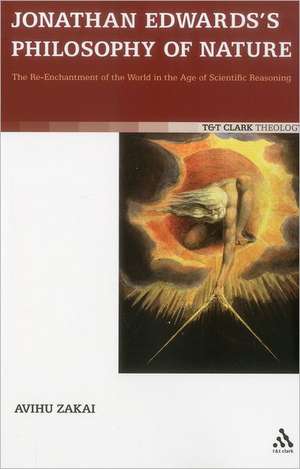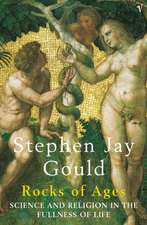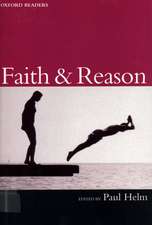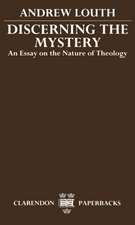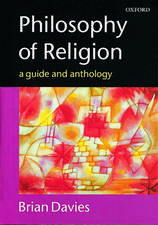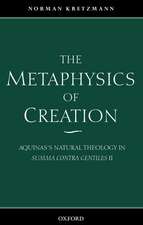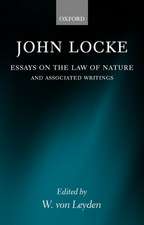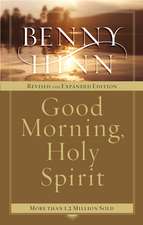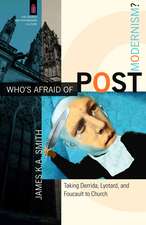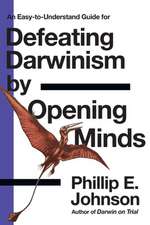Jonathan Edwards's Philosophy of Nature: The Re-enchantment of the World in the Age of Scientific Reasoning
Autor Prof Avihu Zakaien Limba Engleză Paperback – 21 dec 2011
| Toate formatele și edițiile | Preț | Express |
|---|---|---|
| Paperback (1) | 497.56 lei 6-8 săpt. | |
| Bloomsbury Publishing – 21 dec 2011 | 497.56 lei 6-8 săpt. | |
| Hardback (1) | 893.49 lei 6-8 săpt. | |
| Bloomsbury Publishing – 19 mai 2010 | 893.49 lei 6-8 săpt. |
Preț: 497.56 lei
Preț vechi: 559.06 lei
-11% Nou
Puncte Express: 746
Preț estimativ în valută:
95.22€ • 98.37$ • 79.25£
95.22€ • 98.37$ • 79.25£
Carte tipărită la comandă
Livrare economică 26 martie-09 aprilie
Preluare comenzi: 021 569.72.76
Specificații
ISBN-13: 9780567356703
ISBN-10: 0567356701
Pagini: 352
Dimensiuni: 156 x 234 x 18 mm
Greutate: 0.48 kg
Editura: Bloomsbury Publishing
Colecția T&T Clark
Locul publicării:London, United Kingdom
ISBN-10: 0567356701
Pagini: 352
Dimensiuni: 156 x 234 x 18 mm
Greutate: 0.48 kg
Editura: Bloomsbury Publishing
Colecția T&T Clark
Locul publicării:London, United Kingdom
Caracteristici
Sheds
fresh
light
on
one
of
the
most
important
thinkers
of
early
modern
philosophy
and
theology
Notă biografică
Avihu
Zakai
is
Professor
of
early
modern
history
and
early
American
history
at
the
Hebrew
University
of
Jerusalem.
His
fields
of
interest
are
Protestant
religious
history
in
both
Europe
and
America
in
the
early
modern
period,
from
the
Protestant
Reformation
to
the
Great
Awakening
in
America.
In
the
past
he
published
several
books
with,
among
others,
Cambridge
University
Press
and
Princeton
University
Press.
Cuprins
I.
Philosophia
ancilla
theologiae:
Science
and
Religion
in
Jonathan
Edwards's
Thought
1.
philosophia
ancilla
theologiae
2.
Edwards's
Typological
and
Emblematic
View
of
the
World
of
Nature
3.
The
Great
Chain
of
Being
4.
The
God
of
Mechanical
Philosophers
5.
The
School
of
'Physico-Theology'
6.
Edwards
and
the
School
of
Physico-Theology
II.
The
Rise
of
Modern
Science
and
the
Decline
of
Theology
as
the
'Queen
of
Sciences'
1.
Regina
Scientiarum
-
theology
as
the
'Queen
of
Sciences'
2.
Copernicus
-
'Astronomy
is
written
for
astronomers'
3.
Kepler
-
The
new
Physica
Coelestis
(Celestial
Physics)
4.
Galileo
-
The
Book
of
Nature
'is
written
in
the
language
of
mathematics'
III.
'All
Coherence
Gone'
-
Donne
and
the
'New
Philosophy'
of
Nature
1.
The
New
scientia
naturalis
2.
Science,
Fears,
Doubts
and
Anxieties
3.
John
Donne
and
the
'new
Philosophy'
a)
'Doubts
and
Anxieties':
Ignatius
His
Conclave:
b)
'All
Coherence
Gone':
The
First
Anniversarie
IV.
'God
of
Abraham'
and
'not
of
philosophers':
Pascal
against
the
Philosophers'
Disenchantment
of
the
World
1.
'The
Eternal
Silence
of
These
Infinite
Spaces
Frightens
Me'
2.
Pascal
against
the
'Philosophers'
3.
'The
God
of
Abraham'
and
the
'God
of
Philosophers'
4.
The
Theatre
of
Nature:
Natura
naturata
and
natura
naturans
V.
Religion
and
the
Newtonian
Universe
Reactions
to
Newtonian
science
by
Jonathan
Swift,
John
Edwards,
George
Berkeley,
William
Blake,
and
others
VI.
Jonathan
Edwards's
Philosophy
of
Nature:
The
Re-Enchantment
of
the
World
in
the
Age
of
Scientific
Reasoning
1.
The
scientific
Revolution's
Disenchantment
of
the
World
2.
Atomic
Doctrine
3.
The
Mechanization
of
the
World
of
Nature
4.
The
Laws
of
Nature
5.
God
and
the
World
6.
The
Nature
of
the
Created
Order
Recenzii
An
accessible
overview
of
religious
responses
to
the
emergent
natural
philosophy.
[This book] does two valuable services. First, it places Edwards on a scholarly map which joins English and American theatres of philosophy. And secondly, it celebrates a discourse which criticized the new mechanistic philosophies, a discourse which needs to be digested before being injected into modern debates over nature and transcendent meaning, as some readers of Edwards are wont to do.
"It is compelling and profound...It will pay dividends to the reader who wants to struggle with the relationship between the material reality of the world as presented by modern science and the spiritual realities of a God-driven world as implied in the gospel.'
This is an informative volume that situates Edwards in a broad context of early modern religious response to the Enlightenment mechanical philosophy; which divorced nature from spirit. Comparing the American philosopher-theologian Edwards to the likes of Donne, Pascal and Leibniz, Zakai shows that rather than simply reasserting religious claims, Edwards articulated a singularly sophisticated response to the New Science - appropriating what he could while also reconceiving a religious view of the cosmos.
'A stunning achievement, this sustained analysis delineates Edwards's response to early modern science. It positions Edwards with others (like Donne and Pascal) who thought its presuppositions and procedures radically challenged Trinitarian Christianity. While relentlessly criticizing heresies (like Arianism, Socinianism and Deism), Edwards labored to re-invigorate study of the "book of nature" -- through typological exegesis of scripture not mathematical analysis. Philosophically rejecting Newtonian science, Edwards advanced his theology of divine self-disclosure: God creates, sustains, directs and redeems nature and history alike.' - John F. Wilson, Princeton University, Princeton, NJ, USA.
Reviewed by Don Schweitzer, St. Andrew's College, Saskatoon, Canada to appear in the Toronto Journal of Theology (Canada) 'Zakai's study of Edwards in relation to the secularizing trends of early Western modernity offers an insightful and exemplary history of ideas in the early modern period that will be a 'must read' for all Edwards scholars.'
[This book] does two valuable services. First, it places Edwards on a scholarly map which joins English and American theatres of philosophy. And secondly, it celebrates a discourse which criticized the new mechanistic philosophies, a discourse which needs to be digested before being injected into modern debates over nature and transcendent meaning, as some readers of Edwards are wont to do.
"It is compelling and profound...It will pay dividends to the reader who wants to struggle with the relationship between the material reality of the world as presented by modern science and the spiritual realities of a God-driven world as implied in the gospel.'
This is an informative volume that situates Edwards in a broad context of early modern religious response to the Enlightenment mechanical philosophy; which divorced nature from spirit. Comparing the American philosopher-theologian Edwards to the likes of Donne, Pascal and Leibniz, Zakai shows that rather than simply reasserting religious claims, Edwards articulated a singularly sophisticated response to the New Science - appropriating what he could while also reconceiving a religious view of the cosmos.
'A stunning achievement, this sustained analysis delineates Edwards's response to early modern science. It positions Edwards with others (like Donne and Pascal) who thought its presuppositions and procedures radically challenged Trinitarian Christianity. While relentlessly criticizing heresies (like Arianism, Socinianism and Deism), Edwards labored to re-invigorate study of the "book of nature" -- through typological exegesis of scripture not mathematical analysis. Philosophically rejecting Newtonian science, Edwards advanced his theology of divine self-disclosure: God creates, sustains, directs and redeems nature and history alike.' - John F. Wilson, Princeton University, Princeton, NJ, USA.
Reviewed by Don Schweitzer, St. Andrew's College, Saskatoon, Canada to appear in the Toronto Journal of Theology (Canada) 'Zakai's study of Edwards in relation to the secularizing trends of early Western modernity offers an insightful and exemplary history of ideas in the early modern period that will be a 'must read' for all Edwards scholars.'
